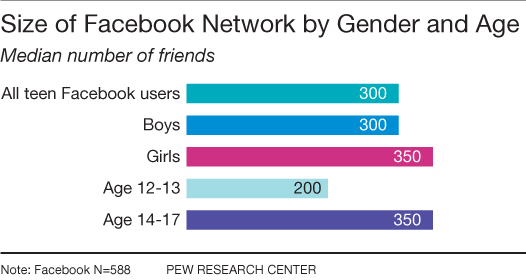9.17 CONVERSATION
SOCIALLY NETWORKED
Prior to 2004, the word friend was exclusively used as a noun, as in “Malik is my friend.” Thanks to Mark Zuckerberg and Facebook, we now regularly use friend as a verb, as in “Did you friend her yet?” This change also led to the invention of a brand-
Look at this chart on the median number of friends teenagers have on Facebook, based on a survey from 2013:

Since it is unlikely that even the most outgoing teenager has over three hundred friends in the traditional sense of the word, what does the word friend mean in an online context? Are we as close with our online friends as with our offline friends? Do we even need to have met our online friends face-
Members of your generation are called “digital natives,” since you have grown up surrounded by the Internet and digital communications technologies such as Facebook, Twitter, Instagram, Tumblr, Snapchat, and hundreds of others. But how has all of this technology changed the way we interact with each other, both online and offline? Does your online persona affect your offline persona? Are they even related? And ultimately, has social networking helped us build connections to other people, or do we feel alone even when we are “connected”?
Researcher Sherry Turkle, one of the authors featured in this Conversation, was told by a college student she was interviewing to not be fooled by “anyone you interview who tells you that his Facebook page is ‘the real me.’ It’s like being in a play. You make a character.” So, in this Conversation, you’ll have an opportunity to think about the ways that we present and shape the online images of ourselves to the world, and how this is changing the nature of our social relationships.